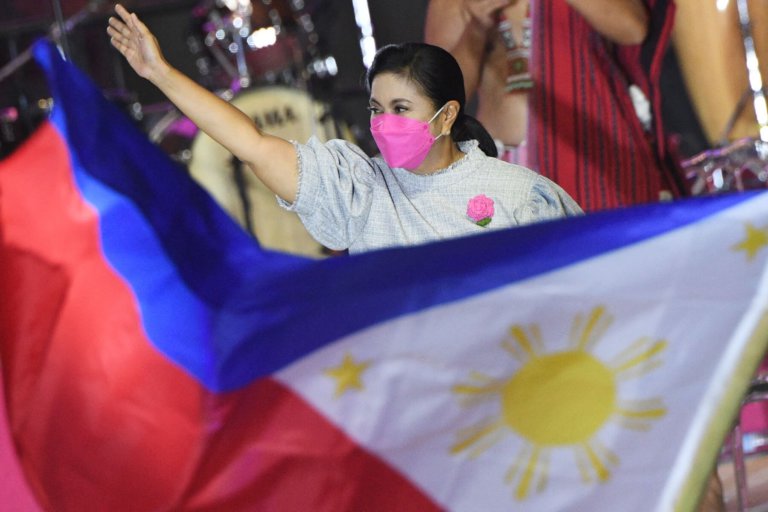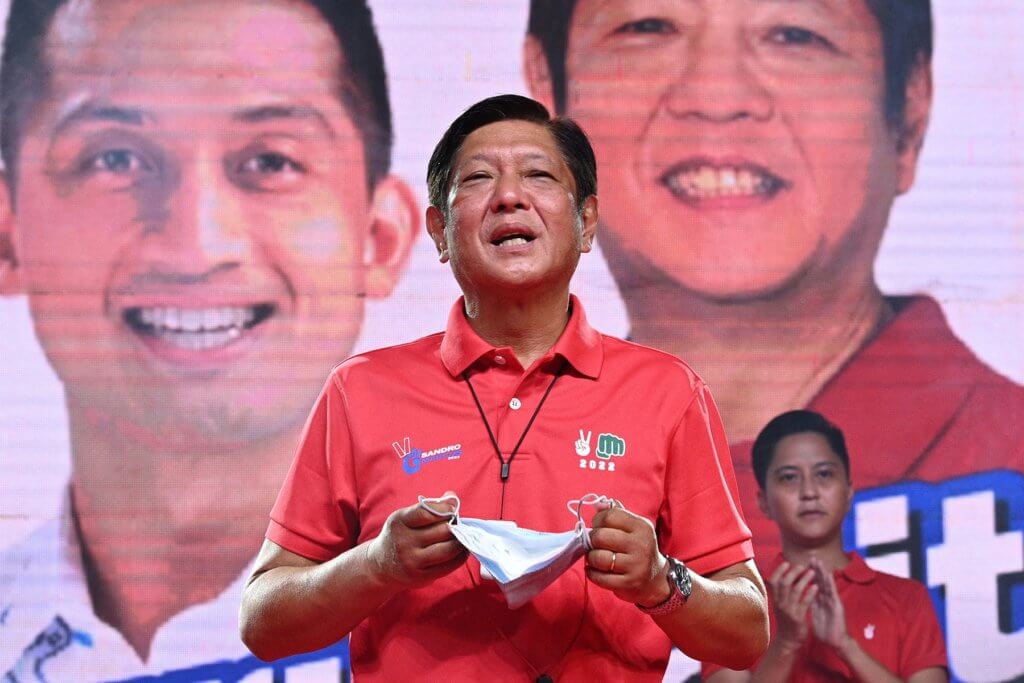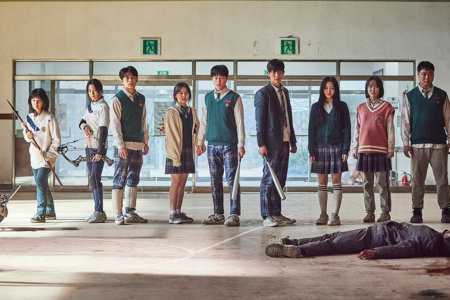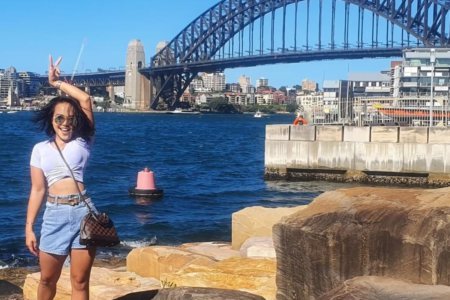
Are you a Filipino student abroad? You’ve probably been closely following the Philippine presidential candidates for the upcoming elections on May 9, 2022.
According to reports, over 67 million Filipinos are eligible to cast their ballots for the upcoming elections, while some 1.6 million Filipinos abroad are eligible to vote.
Before we dive into ways for students to vote, here is a summary of the top Philippine presidential candidates so you can vote wisely on election day.

This photo taken on March 25, 2022 shows Philippine presidential candidate Ferdinand Marcos Jr delivering a speech prior to introducing his son Ferdinand Alexander “Sandro” Marcos (back R) during a proclamation rally in Laoag, Ilocos norte province, north of Manila. Source: Ted Aljibe /AFP
Getting to know the Philippine presidential candidates
These are the key Philippine presidential candidates, according to AFP:
Ferdinand Marcos Junior
Ferdinand Marcos Junior, nicknamed “Bongbong”, is the favourite to win the presidency, capping a stunning comeback for the controversial family.
The 64-year-old’s popularity has been driven by a massive social media misinformation campaign targeting a mostly young electorate with no memory of the torture, killings and other abuses committed during his father’s rule.
Marcos Jr has also drawn support from his formidable alliance with Sara Duterte, the backing of other powerful dynasties and the family’s northern stronghold.
Leni Robredo
Incumbent Vice President Leni Robredo, 57, is the only woman in the presidential contest and is the most serious rival to Marcos Jr for the top job.
After languishing in the polls, Robredo’s volunteer-driven campaign gained traction in recent weeks as diehard supporters went door to door across the archipelago to drum up support.
The latest voter survey showed the mild-mannered Robredo narrowing the gap, fuelling hopes among her fans that the former congresswoman could cause an upset — as she did in the 2016 vice presidential contest.
If Robredo were to win, she would be only the third woman leader of the Southeast Asian nation.
Francisco Domagoso
A former street scavenger turned actor, Francisco Domagoso enjoys celebrity status in Manila where he has been mayor since 2019 after wresting the post from disgraced ex-president Joseph Estrada.
Domagoso, 47, popularly known by his screen name “Isko Moreno”, has been credited with ridding the streets of hawkers and overseeing cheap housing projects.
Voter surveys show he has lagged in third place behind Marcos Jr and Robredo, but he has refused to pull out of the race and recently called on Robredo to quit.
My hats off to @cnnphilippines for an event well-organized and to my fellow presidential candidates for a lively, sensible exchange of ideas and opinions about the country’s issues for the benefit and discernment of Filipino voters. Maraming salamat!
Photo source: CNN PHILIPPINES pic.twitter.com/mm2CmbSg1f— Manny Pacquiao (@MannyPacquiao) February 27, 2022
Manny Pacquiao
A rags-to-riches sporting icon, Manny Pacquiao ended a glittering 26-year career in the ring last year and threw his hat into the presidential contest.
The 43-year-old senator is deeply religious and made fighting corruption and poverty key themes of his “Man of Destiny” campaign. But the messages failed to hit the mark.
He risked political capital in a public stoush with the still-popular Duterte last year, and has been stalked by previous admissions of drug use and homophobic comments.
Panfilo Lacson
A former police chief turned senator, Panfilo Lacson, 73, is making a second against-the-odds tilt for the presidency after a failed attempt in 2004.
Lacson is known for cracking down on kidnap-for-ransom groups targeting the ethnic Chinese community in the 1980s and 1990s.
During that period, he was accused and later cleared of involvement in multiple murders, including 11 suspected bank robbers.

The Philippines election is drawing near. Source: Noel Celis/AFP
How Filipinos abroad can vote
Now that you’re acquainted with some of the key Philippine presidential candidates, how can you exercise your right to vote come election day?
Confirm that you’re a registered voter
First, visit the Commission on Elections’ (Comelec) Certified List of Overseas Voters (CLOV) website to confirm that you’re a registered voter.
Do note that aspiring voters who were unable to register will not be permitted to vote, as the registration period closed on Oct. 14, 2021.
The voting process depends on your host country
How you can vote will vary depending on where you are.
You may be able to vote at Philippine embassies, consulates, and other designated polling places. You could also receive your ballots via post.
The Rappler has also compiled advisories from embassies and consular offices for Filipinos abroad who wish to vote:
London, UK
Voting period: April 10 to May 9
How to vote:
The Philippine Embassy in London (which covers the UK, Northern Ireland, Ireland, Isle of Man, Bailiwick of Jersey, and Bailiwick of Guernsey) will be conducting postal voting.
Voting will be done via mail, but you can drop your ballot at the embassy. Click here for details.
US
Voting period: April 10 to May 9
How to vote:
According to the Rappler, the Philippine embassy and all its consulates in the US will be conducting postal voting.
You will receive election packets via mail to your registered mailing addresses. These must be mailed back to the Philippine posts as soon as possible, or be dropped off at the embassy mailboxes.
Canada
Voting period: April 10 to May 9
How to vote:
The Philippine Embassy in Ottawa and its consulates in Calgary, Toronto, and Vancouver will be conducting postal voting.
You will receive election packets via mail to your registered mailing addresses. Accomplished ballots must be mailed back to the Philippine posts quickly.
Stay abreast of updates here.
New Zealand
Voting period: April 10 to May 9
How to vote:
According to philstar, the Philippine Embassy in Wellington serves 29,304 registered voters in the Cook Islands, French Polynesia, Samoa, Tonga, New Zealand and Fiji. You can cast your ballots through postal voting and an automated election system.
Ultimately, if you’re a Filipino abroad, always cross-check with your relevant embassies about the voting process and stay abreast of updates via the embassy’s social media platforms.










